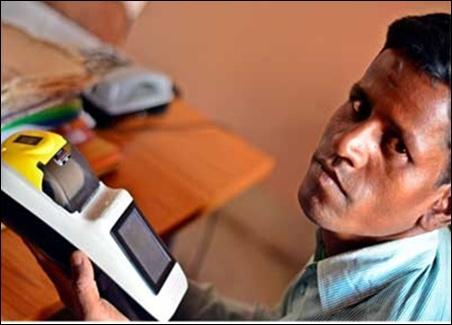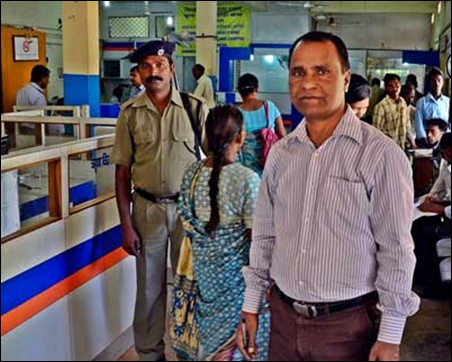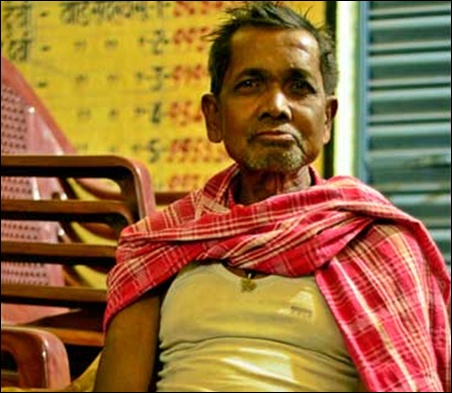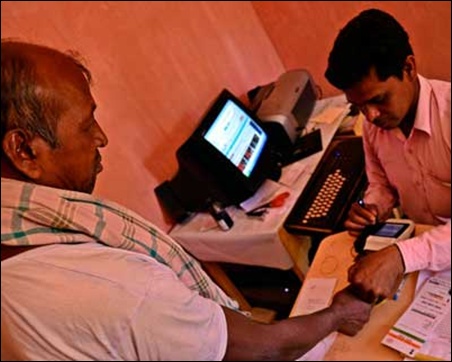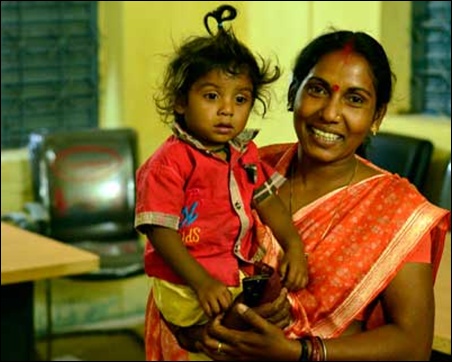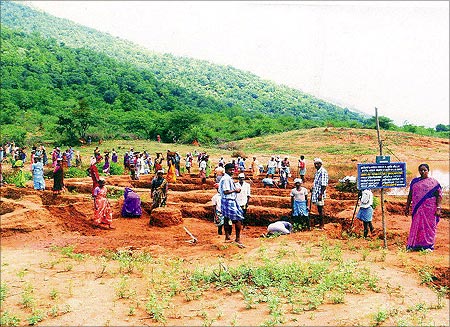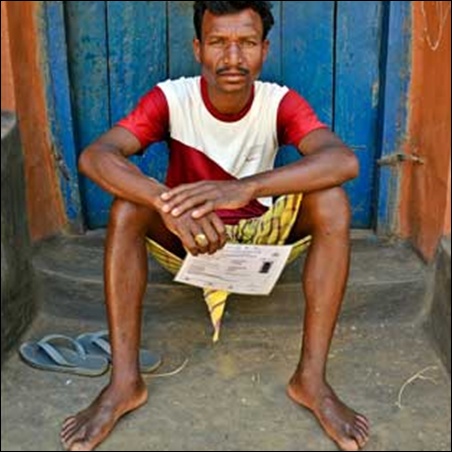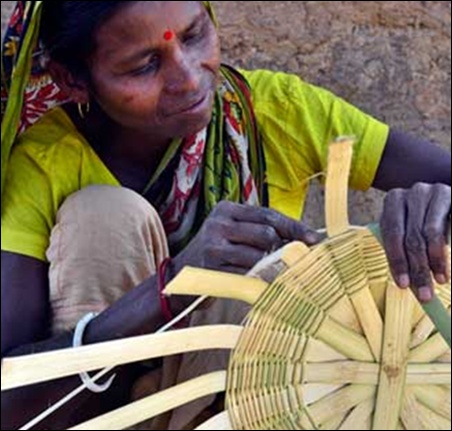 | « Back to article | Print this article |
How Aadhar is transforming lives across Jharkhand
The bespectacled, clean-shaven and nattily dressed deputy commissioner of Ramgarh, Amitabh Kaushal, certainly looks the part of a pioneer.
He is, after all, one of the select few district administrators implementing India's ambitious Aadhaar-enabled payment system.
More significantly, he is the leader of a team of ghost busters.
For all the problems the UID pilot projects in Jharkhand have thrown up, there are those like Kaushal who remain convinced Aadhaar can deliver on its stated promise. Indeed, he has reason to believe in its success.
In Ramgarh's Gola block, which comprises 21 panchayats, a little over 2,000 of the approximately 35,000 Mahatma Gandhi National Rural Employment Guarantee Scheme (MGNREGS) card holders have been identified as ghost beneficiaries.
Click NEXT to read more...
How Aadhar is transforming lives across Jharkhand
"Some families had two or three (MNREGS) job cards, though they are supposed to have only one card per household. We were able to identify this when the job cards were being matched with the Aadhaar numbers," explains Bhagirath Prasad, Ramgarh's executive magistrate and Kaushal's right-hand man for UID-related activities.
The potential an expanded Aadhaar programme has in identifying and removing ghost beneficiaries from large social welfare programmes cannot be understated and in this, the pilot projects are already posting tangible results.
Click NEXT to read more...
How Aadhar is transforming lives across Jharkhand
Transforming payments
At Dohakatu, another panchayat in the Ramgarh district, and possibly the only village in the country where MGNREGS, old-age pensions and school stipends are paid using Aadhaar, technology seems to be transforming the lives of the settlement's 1,070 households.
Now, pensioner Basudeb Pahan doesn't need to make the 15-kilometre trek through a hilly road to Ramgarh, where he would mandatorily need to queue at the bank for hours to get his money, a small sum of Rs 400, he claims.
"I wouldn't always get my money in a single day. Sometimes, I would have to go back the next day. And, it costs money, something like Rs 50 for getting there and some food for the day. Now, there's no tension," the 70-year old says, pointing at the road he now takes for the short walk to the panchayat office for payments.
Click NEXT to read more...
How Aadhar is transforming lives across Jharkhand
For MGNREGS workers like Birsa Pahan, it isn't merely avoiding the treacherous travel to Ramgarh and the entire day that would be spent there waiting, but the newfound swiftness of the payment cycle that is the real advantage of Aadhaar's introduction into the employment scheme's framework.
"Before Aadhaar, we would sometimes have to wait two or three months for the payments to arrive. Now, we get the money in about a week. We need money to run our households, and nobody wants to wait for months for the wages to come through. Back then, we didn't trust the system," says the father of four.
Click NEXT to read more...
How Aadhar is transforming lives across Jharkhand
Kalamati Devi, the mukhia (headwoman) of Dohakatu, says the previous system of receiving money through banks and post offices, which is how the majority of MGNREGS wages are paid in the rest of the country, would not only mean inordinate delays, but also unwanted harassment during the collection of wages.
"Earlier, everyone would crowd the bank or post office and in the rush, it was difficult to clear any doubt about the amount finally paid. And, since all of us aren't literate, middlemen would often take their cut for filling in the forms and helping people process the payments. Now, after a few transactions, we all know what to do and ask," she says.
Click NEXT to read more...
How Aadhar is transforming lives across Jharkhand
Across the pilot projects in Jharkhand, Aadhaar seems to have successfully streamlined the MGNREGS payment mechanism.
With bank accounts for all beneficiaries integrated with their Aadhaar numbers, it is easier for the panchayat, the district administration and banks to process the information faster and more accurately, restricting leakages to some extent.
Arbind Prasad, the assistant director general at UIDAI's regional office in Ranchi, claims the implementation of Aadhaar in the employment scheme has had two clear successes.
"Now, only the intended beneficiaries will get the money, and they will get all the money due to them," he says.
Click NEXT to read more...
How Aadhar is transforming lives across Jharkhand
No magic bullet
However, in spite of successes, there is an overwhelming feeling that the UIDAI and Aadhaar are trying to plug holes in a sinking ship. Both UID officials, as well as those from the district administration, acknowledge Aadhaar can only help stop leakages in the MGNREGS to a certain extent.
This is because the UID-linked system has only been implemented at one end of the employment scheme: payments.
The gaping holes through which funds can be siphoned off remain open, as there is still no process to ensure the muster rolls, or the attendance sheets for each MGNREGS project, are not fudged.
Click NEXT to read more...
How Aadhar is transforming lives across Jharkhand
"If they make the muster rolls incorrectly, there's nothing we can do about it right now. We are only a bridge to facilitate the payments," says an UIDAI official.
A K Sinha, the additional MGNREGS commissioner in Ranchi, agrees there is scope for the outflow of funds during work allocation and making of the muster rolls.
But he says the state government is actively planning the creation of an e-muster roll system, one in which a worker's attendance can be authenticated through a handheld device. He is, however, unable to provide the specifics about this system or a timeline for its implementation.
Click NEXT to read more...
How Aadhar is transforming lives across Jharkhand
Aadhaar, after all, remains a technology solution that can be integrated with an existing social welfare scheme.
Its eventual success depends on the efficacy of the underlying scheme and the support it receives from other stakeholders, including the state government and banks.
The UID can help reform, but it cannot remodel or rearrange an existing system.
Click NEXT to read more...
How Aadhar is transforming lives across Jharkhand
Yet, for the 2,600-odd MGNREGS workers in Jharkhand who have experienced Aadhaar and been paid using its technology, the defunctive quality, once widely associated with the employment scheme in the hinterland, is slowly abating.
"Once we used to say those who do MGNREGS shall not survive (joh MGNREGS karega, woh marega). Now, that perception has changed," says a resident of Ratu's Tarup, before walking into the panchayat building to receive his Aadhaar-enabled payment.
